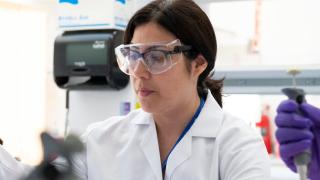
Roughly 15-20% of people diagnosed with colorectal cancer (CRC), the third most common cancer diagnosed in both sexes in the U.S., excluding skin cancer, will have tumors with deficient mismatch repair (dMMR) systems resulting in the presence of a molecular fingerprint classified as microsatellite instability high (MSI-H) CRC. MSI-H tumors are also associated with other solid tumors, including gastric and gastro-esophageal junction cancers. While early-stage MSI-H tumors have been shown to respond well to immunotherapies and have relatively positive prognoses, later-stage tumors are less responsive to traditional strategies used to treat MSI-stable tumors.
The first-in-human, Phase 1 trial of neoantigen vaccine candidate Nous-209 for patients with metastatic dMMR/MSI-H CRC, gastric and gastro-esophageal junction tumors may lead to improved prognoses and survival outcomes regardless of MSI-H cancer stage. Being led at City of Hope by Marwan Fakih, M.D., the Judy & Bernard Briskin Distinguished Director of Clinical Research, the study aims to evaluate the safety, tolerability, immunogenicity and anti-tumor activity of Nous-209. The multicenter investigation is being conducted in conjunction with physician-scientists from Johns Hopkins University, Dana Farber Cancer Institute, MD Anderson Cancer Center and other institutions.
Assessing primary and secondary outcomes of Nous-209 in an open-label phase 1 clinical trial
While only 5% of metastatic CRC patients have microsatellite instability, those patients appear to be less responsive to chemotherapy. The recent approval of pembrolizumab immunotherapy provides hope for patients with MSI-H tumors; however, 30% of patients currently progress within two months of initiation of therapy. A successful vaccine, given in conjunction with immunotherapy, may improve further on the responses of pembrolizumab and may provide clinical benefits in patients who, otherwise, may not have responded to pembrolizumab monotherapy.
The team will be investigating the vaccine candidate based on a heterologous prime-boost immunization strategy delivered intramuscularly. Participants will receive one prime dose of Gad20-209-FSP and three boosts of MVA-209-FSP in combination with pembrolizumab, a programmed death receptor-1 antibody. The main study is comprised of two sequential cohorts, and the study duration is 26 weeks. The first cohort will allow the scientists to determine the recommended Phase 2 dose (RP2D). Once determined, the RP2D will be given to the second cohort. Extended follow-up of the study will continue up to week 106, and then an additional four weeks to continue monitoring adverse events.
Using MSI-H tumor neoantigens to develop an immunogenic vaccine
Throughout the genome, there are small repeated sequences of nucleotides called microsatellites (MS). These sites are associated with a high frequency of errors, which are normally corrected by the MMR system. When the dMMR system within a tumor fails to recognize or correct mismatched base pairing or insertion-deletion loops, the accumulations result in MSI. As MS can be found in DNA coding regions, insertion or deletion errors in these portions of DNA result in frame-shift mutations that lead to the production of truncated proteins, or frame-shift peptides (FSPs).
The generation of these FSPs creates a repertoire of tumor-specific neoantigens that are likely to be highly immunogenic as they’re completely foreign to normal self-proteins. Additionally, as similar genes among MSI-H patients are mutated, the neoantigens are also shared among different patients, creating a unique opportunity for the development of an off-the-shelf immunotherapy like Nous-209.
The vaccine candidate encodes 209 unique FSP cancer neoantigens that could potentially lead to anti-tumor immune responses and long-term anti-cancer immunity. The ability to target neoantigens of a specific type of cancer, or turn immunogenically “cold” tumors into those that are sensitive to immunotherapy, would have broad applications in the cancer field.
To enroll a patient in a clinical trial, visit Cityofhope.org/clinicaltrials or call 626-218-1133.
